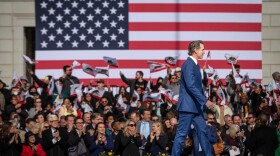President Obama, backed by British and French leaders, demanded Friday that Iran open for inspection a previously secret uranium enrichment plant, warning Tehran that it would be "held accountable" if it continued to flout the rules of international conduct.
In a dramatic joint statement, Obama — flanked by British Prime Minister Gordon Brown and French President Nicolas Sarkozy — said the existence of the site "deepens a growing concern" that Iran has failed to live up to its international obligations to fully disclose its nuclear ambitions. Obama said Iran "is breaking rules that all nations must follow, endangering the world non-nuclear proliferation regime ... and the security of the world."
"The Iranian government must now demonstrate through deeds its peaceful intentions or be held accountable to international standards and international law," Obama said.
Sarkozy said Iran had until December to comply or "sanctions will have to be taken."
"Everything must be put on the table now," he said.
The leaders' remarks at the G-20 summit in Pittsburgh came just hours after the International Atomic Energy Agency said it had received a letter from Tehran admitting the existence of the facility, the second known to exist. A senior White House official said U.S. intelligence had been aware of the project for years and that going public with the information was prompted by Iran's discovery that Western powers knew about the plant.
"The level of deception by the Iranian government will shock and anger the international community and it will harden our resolve," Brown said.
Iran had previously admitted to having only one enrichment facility at Natanz, 150 miles from Tehran, which is already being monitored by inspectors. The U.S., Israel and other countries believe Iran is trying to create nuclear weapons, though Tehran has denied it.
Later, Iran's ISNA news agency quoted an "informed source" on Friday as confirming the second enrichment facility, saying it was "similar" to the previously acknowledged plant. The second plant falls within the framework of IAEA regulations, the agency said.
An IAEA spokesman in Vienna says the body has now asked Iran to provide specific details about the site and access to it as soon as possible.
In Obama's brief remarks, he said that German Chancellor Angela Merkel was unable to be present for the joint statement, but that she supported the other three leaders.
Iran admitted to the second plant in a letter it sent to IAEA chief Mohamed ElBaradei. Although the facility, 100 miles southwest of Tehran, has been hidden from weapons inspectors, the U.S. has long known of its existence, an official told AP. Obama decided to go public with information of the facility after Iran caught on that Western intelligence agencies knew of its existence.
The New York Times reported U.S. officials said the second site is being built inside a mountain and could be ready for operation next year.
Iran is already under three sets of U.N. Security Council sanctions for refusing to freeze enrichment at the Natanz plant.
An August IAEA report said Iran had set up more than 8,000 centrifuges to enrich uranium at Natanz. It said about 4,600 centrifuges were fully active.
Tehran has steadfastly maintained that it has the right to enrich uranium for a nationwide chain of nuclear reactors. But because enrichment can also produce weapons-grade uranium, the international community fears Tehran will make fissile material for nuclear warheads.
The IAEA believes Iran has amassed more than a ton of uranium from its older Natanz centrifuges that is less than 5-percent enriched. That would give Tehran more than enough material to produce enough weapons-grade uranium through further enrichment for one nuclear weapon.
The revelation of a secret plant further hinders the chances of progress in scheduled Oct. 1 talks between Iran and six world powers. At that meeting, the first in more than a year, the five permanent U.N. Security Council members and Germany plan to press Iran to scale back its enrichment activities. But Tehran has declared that it will not bargain on enrichment. Iran's nuclear negotiator dismissed the threat of new sanctions in an interview released Friday.
Obama said Iran "must be willing to cooperate fully to demonstrate that it is willing to fulfill peaceful intentions."
On Thursday, Italian Foreign Minister Franco Frattini said the Group of Eight industrialized nations is giving Iran until year end to commit to ending uranium enrichment and avoid new sanctions.
The existence of a secret Iranian enrichment program built on black-market technology was revealed seven years ago. Since then, the country has continued to expand the program with only a few interruptions as it works toward its aspirations of a 50,000-centrifuge enrichment facility at Natanz.





